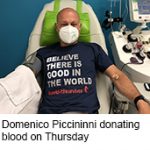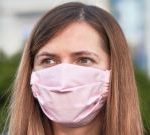
Domenico Piccininni is one of the hundreds of thousands of people who have had a COVID-19 infection and recovered after a bit of misery, but with no lasting complications. What sets him apart from many other survivors is that Piccininni is trying to help people who now have more severe COVID-19 infections. On Thursday, the Atlanta-area resident donated his plasma. Plasma is a component of blood that contains antibodies, which are made by the immune system in response to a specific infection. Because the 50-year-old Piccininni recovered from a COVID-19 infection, his body now produces antibodies that are primed to fight the new coronavirus. The hope is that giving his plasma and antibodies (called “convalescent plasma”) will help kick-start the fight against the virus for people who are currently very sick with COVID-19 infections. Piccininni is a reluctant hero, though. At first, he thought he wouldn’t want anyone to even know that he had been sick with COVID-19. He worried there might be a potential stigma. “I felt like [having had the infection] might be like a scarlet letter, but the doctor said I should think of it more like a badge of honor, because I could help people,” Piccininni said. He also admitted to being a bit uneasy about the procedure because he didn’t quite know what to expect. “My wife volunteered me,” he… read on >

















